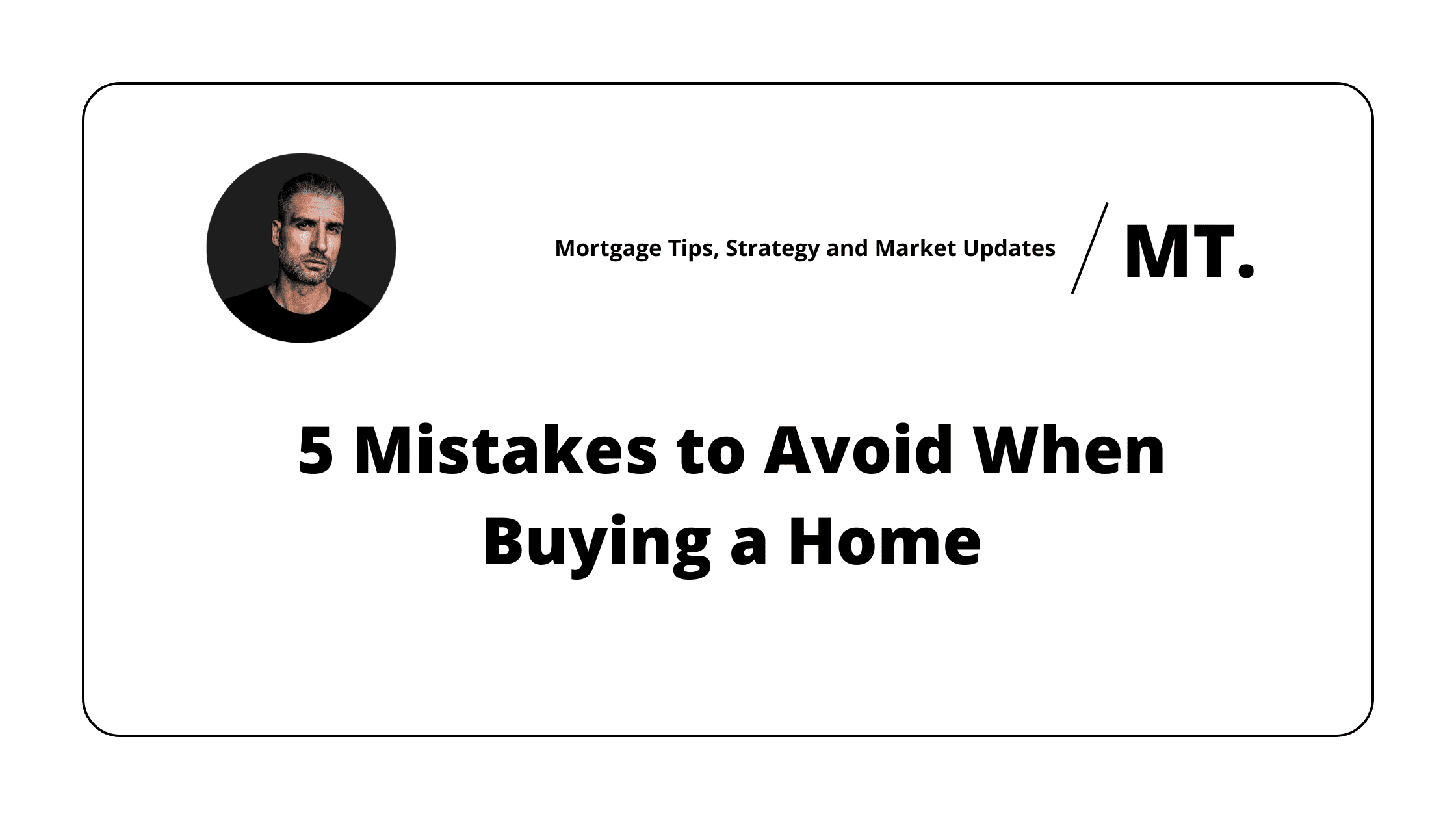Read Time: 3 Minutes
5 Mistakes When Buying a Home to Avoid
Buying a home is one of the most significant financial decisions you will make.
Avoiding common mistakes when buying a home can help to avoid financial turmoil in the future.
Making a mistake could delay retirement, or the upsize you need for a growing family.
Based on my experience, and feedback from Realtors and Financial Planners I work with, here are the biggest mistakes we see.
Now, let’s dive in!
1. Skipping Detailed Budgeting
When budgeting for a home, it is crucial to account for more than just the purchase price.
Before moving forward, you need to consider all costs.
This will make sure you don’t put yourself in a tough spot later.
There are two main areas you need to consider.
The first is the total funds you will need to close on the property, plus moving expenses.
Closing costs to consider are:
- down payment
- land transfer tax
- lawyer fees
- title insurance
- PST on mortgage insurance
- appraisal
- home inspection.
The second point to consider is that owning a home costs more than the mortgage.
Your monthly budget needs to include expenses.
These include the mortgage, home insurance, utilities, property tax, and property maintenance.
For maintenance, budget for condo fees or 1% of home value each year for freehold homes.
Beyond the cost of carrying the home, you also need to account for life outside the home.
Think about retirement savings, rainy day savings, education funds, vacations, etc.
One great way to think about it is: what are you spending on your housing needs today?
Maybe that’s rent and down payment savings.
If you can match these housing costs as an owner, then you’d enjoy the same financial freedom.
If not, things are going to feel tighter.
A detailed budget will show you what you can afford, and is something that I prepare for every client.
Avoid this mistake when buying a home, it will help prevent financial strain.
2. Not Getting Pre-Approved
A pre-approval is essential in the home buying process.
It shows Realtors and sellers that you are a serious buyer.
It also gives you a clear idea of your borrowing limit.
Without pre-approval, you are wasting time.
You might look at homes outside your budget or miss out on opportunities.
In a competitive market, a pre-approval gives you an edge.
You’ll be ready for any opportunities.
Not knowing your borrowing power or any limits will cause confusion.
It will frustrate you in your buying journey.
This is your first step.
3. Not Thinking Long-Term About Needs
When buying a home, consider your long-term needs.
Think about how long you plan to stay in the home and how your lifestyle might change over the years.
This includes considering family size, work location, and community amenities (schools, transit, parks, etc…).
Ensure the home you choose meets your future needs and must-haves.
Thinking long-term helps you make a more informed decision and avoid the need to move again soon.
This is very important in Canada.
The cost of buying and selling real estate here is extremely high.
Make sure you have your list of requirements in a home, and don’t miss the opportunity to jump on something that meets your needs.
4. Making Financial Changes Before Closing
Avoid making significant financial changes before closing on your home.
This includes changing jobs, taking on new debt, or making large purchases.
Lenders re-evaluate your finances before finalizing the mortgage.
Any changes can jeopardize your approval.
Keep your financial situation stable between getting pre-approved and offering on your home.
And you definitely don’t want to make any changes after you’ve committed to buying a home and the final closing.
Avoid opening new credit accounts or making big purchases.
These actions can hurt your credit score and your mortgage approval.
If you are considering any major purchases, make sure you run them by your mortgage broker first!
5. Skipping a Home Inspection
A home inspection is a critical step in the buying process.
It helps to find possible issues with the property.
These may not be visible during a viewing.
Skipping this step can lead to costly repairs and unexpected problems after you move in.
An inspection can uncover problems with the roof, plumbing, electrical systems, and more.
Knowing about these issues beforehand allows you to negotiate repairs.
Or, it lets you understand what you are committing to when buying the property.
Avoid these mistakes when buying a home.
They will make home buying harder and hurt your finances.
Stay proactive.
Seek professional advice when needed.
Approach your home purchase with confidence.
Overview
Subscribe to begin.
Join 7.5k+ subscribers and get tips, strategies and market updates every other Thursday morning.







